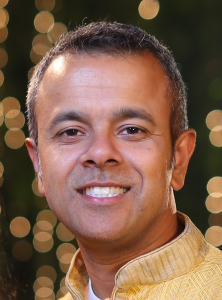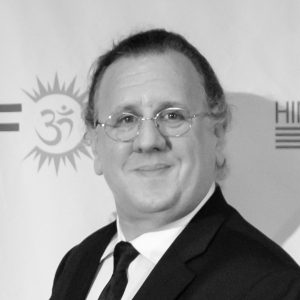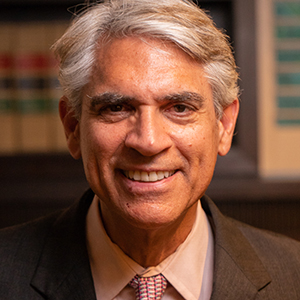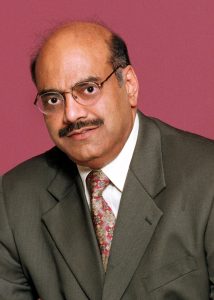What does Hinduism mean to I Am Hindu American participants? We asked a sampling of people who submitted profiles a similar set of questions, hoping to shine light on their beliefs, practices, and motivations.
Constant evolution and the possibility of a limitless identity: Rajeev Singh
 What does Hinduism mean to you?
What does Hinduism mean to you?
Hinduism means freedom of thought to create a rich tapestry of human values, philosophy, arts, and sciences.
What is the essence of Hinduism?
Constant evolution and the possibility of a limitless identity. Not one, but numerous paths, practices, and piety.
How does Hinduism inform your daily life?
Hinduism prevents me from getting too entangled in stuff and issues of life. The rich canvas of history, narratives, and lores remind me of my insignificance but the imperative to engagement and action in this world.
What’s your spiritual practice like?
My spirituality’s bedrock is observations. See, hear, feel, read. Observe the world around me. Think about it and then seek silence, even if it is 15 minutes a day.
What’s the one thing you wish non-Hindus knew about Hinduism?
The inherent respect and fellowship a Hindu naturally feels for other human beings. I wish that non-Hindus understood how unnatural and obtuse the idea of proselytization is for a Hindu.
How is it being a Hindu in the United States, a member of a minority faith community?
United States is an incredible success story of political evolution and freedom. As set up constitutionally, it is a significant overlap with the principles of governance that come naturally to Hindus: separation of church and state, freedom of thought, speech, pray, practice, etc.
On the flip side, it is at times disheartening to see the misguided and irrational influence some religions want to have on policies. These in-egalitarian undercurrents that aim to benefit only a bloc within the nation are not always visible to the Hindus or are dismissed out of disbelief. As a minority it leads to occasional disjuncture and moments of existential anxiety.
If there’s one misconception about Hindus or Hinduism you wish were cleared up, what would it be?
It’d be that Hindus worship many gods. I want non-Hindus to understand that Hindus worship creation in its many forms — humans, animals, phenomenon, energy, et cetera. God is not an absolutely must-have entity for a Hindu. In fact, a Hindu doesn’t have to worship anything at all.
Embrace life, follow our dharma, have an intimate relationship with the Divine: J. Marion
 What does Hinduism mean to you?
What does Hinduism mean to you?
To me it is about embracing life, following our dharma, and having an intimate relationship with the Divine.
God is not relegated to one day, one building, or one form. Our relationship with God is constant and ever evolving.
Hinduism to me is about nurturing the type of relationship that allows us to experience God in the grand and beautiful as well as the ordinary and mundane.
What is the essence of Hinduism?
Everyone will have a different answer to this question so at one level unity in diversity. For me the essence is prema (love). It’s the experience of love for Sri Vishnu and experiencing that love back. It is a love that creates trust and requires us to be active participants in the world. With love there is also action and duty according to our individual natures. Hinduism lets us understand and embrace our natures as a part of the path of love.
How does Hinduism inform your daily life?
Hindu practice and the remembrance of Sri Vishnu is woven throughout my day. From the chanting of the Sri Vishnu Gayatri in the morning; to imagining the strength of Bhima and Hanuman when I’m in the gym; to singing the Lord’s names at night. Sanatana Dharma is the fabric of daily life.
Being legally blind I face a lot of challenges throughout the day. The Bhagavad Gita a source of comfort and encouragement. When encountering some of daily problems often caused by others trying to be “helpful” I remind myself that Ishvara resides in every heart.
What is your spiritual practice?
I am a bit of a “non-denominational” Vaishnava. My practice consists of pujas, singing bhajans, recitation of Lord Vishnu’s names, and chanting of his mantras. I also on occasion attend the Hindu Temple Society of North America (Ganesha Temple) and kirtan evenings at the Bhakti Center in NYC.
One thing you wish non Hindus knew about Hinduism
I wish people knew the countless contributions Hinduism has made to society, for example: the decimal system, zero, the number system, chess, cataract surgery; Hindus were the first to give the age of the universe; Hindus first knew the earth was round, etc. There is a lot of erasing of Hindus and Hinduism that happens and I’d like to see that change.
How is it in the United States, a member of a minority faith community?
One of the most frustrating aspects of being Hindu in the West is the general lack of knowledge as well as the misconception that one must be Indian to practice Sanatana Dharma. I have encountered this belief from academics and average people which sometimes leads to accusations of faking or cultural appropriation. It’s a strange discourse given that these same individuals don’t question Caucasians converting to Islam or Indians converting to Christianity. These individuals also lack knowledge of the spread of Sanatana Dharma from Afghanistan and Russia to Indonesia and beyond.
A sense of duty, the wonder of nature, living mindfully: Kesha Ram
 What does Hinduism mean to you?
What does Hinduism mean to you?
Hinduism, for me, has always been about a sense of duty, the wonder of nature, and living mindfully.
Wherever we went as children, my father encouraged us to look around for someone to help, a wrong that we could work to make right. He also chose everything from where we lived to a majority of our travels by its proximity to nature and access to clean natural resources.
Finally, although I felt like I could have done without the wheatgrass juice and early morning yoga when I was younger, I am grateful he gave us healthy, mindful habits to develop our spiritual and physical strength. All of these elements integrate not just into a helpful practice, but a rich life. I am so grateful for my Hindu upbringing, which has helped make me who I am today.
Believe in our shared oneness: Shikha Uberoi Bajpai
 What is the essence of Hinduism?
What is the essence of Hinduism?
The essence of Hinduism to me, is to use this life to express the limitlessness of one’s true, ultimate self. Hindu teachings define truth as one, as in everything is one. Realizing the limitless nature of your ultimate self is seeing everything as one.
What’s the one thing you wish non-Hindus knew about Hinduism?
First of all, Hindus do not fit in the Abrahamic perspective and that’s perfectly alright. I don’t believe we need to fit Hinduism into predetermined molds and especially those that don’t have the shape Hinduism fits in to. Creating our own mold in America has been an arduous task when Hinduism doesn’t work with molds the begin with. I believe this is important caveat start a conversation on Hinduism.
How is it being a Hindu in the United States, a member of a minority faith community?
In our national climate, being Hindu is the biggest strength I have. Moreover, it’s a metaphor for what I see in our country today. Because believing in our shared oneness and expressing ourselves to our ultimate potential are not only Hindu core principals, they are American values. They are everything it means to be an American and what will always make America the greatest nation. Expressing my Hindu identity is the most American I can be.
Hinduism is a source of boundless joy and infinite love: Jeffery Long
 What is the essence of Hinduism?
What is the essence of Hinduism?
It is the Sanatana Dharma, the universal and perennial philosophy and way of life underlying all existence.
What does Hinduism mean to you?
Hinduism is the philosophy that makes sense of my life, that turns my life into a meaningful story and not just a random series of events. It gives context for all of life’s difficulties and experiences of suffering, and hope for a limitlessly better future, as well as a set of practices and principles to make that future a reality: to realize our inherent divinity here and now, and not just in a future state. It is a source of boundless joy and an expression of infinite love.
The word ‘Hinduism’ refers to this philosophy and the practices associated with it, as they have been preserved by the cultures of India. It is really universal and all-pervasive.
I would personally use the word ‘Vedanta’ instead, but most Americans are not familiar with this term, whereas they have heard of Hinduism.
How does Hinduism inform your daily life?
It shapes the structure of my day, which is built around my morning and evening puja and meditation.
Because my career also involves teaching and writing about Hinduism, my mind is full of Hindu concepts and texts throughout much of the day.
I am very grateful for this, because my work requires me to think about spiritual things, rather than being a distraction from spiritual things.
What’s your spiritual practice like?
I meditate twice a day, using the mantra given to me by my guru in the tradition of Sri Ramakrishna. I also repeat my mantra silently on many other occasions throughout the day.
I try to see the divinity in everyone, and to realize that my experiences are a mirror of my consciousness reflecting back to me.
I listen to inspirational music that reminds me of spiritual principles: traditional Hindu music, such as kirtan, but also artists like George Harrison who are grounded in bhakti.
I celebrate all the major Hindu holidays and participate in temple activities.
What’s the one thing you wish non-Hindus knew about Hinduism?
That it’s not all just exotic and stereotypical (‘cows, caste, and curry’) but is a profound and life-transforming philosophy and science of spirituality.
I wish they viewed Hinduism more in the way that they view Buddhism: positively, as a source of deep and helpful truths for the contemporary world.
How is it being a Hindu in the United States, a member of a minority faith community?
I am a ‘white’ Hindu, and a male, and a professor, so I think I am personally pretty privileged. And my job involves me in regularly explaining Hinduism to non-Hindus. So, for me, it is not bad at all.
I feel attacked when I encounter the exclusivism of other religions (such as the belief that Hindus and other religious minorities are going to hell and need to be converted). But I felt the same way back when I was a member of the dominant religion and never agreed with that way of thinking.
For me, being Hindu is consistent with what has always been my independent-minded way of thinking.
If there’s one misconception about Hindus or Hinduism you wish were cleared up, what would it be?
The identification of Hinduism with caste prejudice, patriarchy, and Islamophobia. I guess those are three misconceptions!
To narrow it down to one: the view that being Hindu involves being bigoted and narrow-minded. For me, it is exactly the opposite.
There are Christians who say that Hinduism is a religion of ‘works,’ where you earn your way to God’s favor, rather than a religion of divine grace, and then criticize it on this basis. Is this a true characterization of Hinduism?
This is not true at all. One does not ‘earn’ one’s way to moksha through good works. Good works bring good karma. Moksha is freedom from all karma. Good works do not bring moksha. Moksha comes from realization. Good works can create the habits and conditions in the mind that make it a conducive instrument for realization. But realization is the awareness of what was always the case: that we are infinite being, consciousness, and bliss. In the words of Swami Vivekananda, “Religion is realization.”
Hinduism is a philosophy, practice, and mindset that informs my existence: Fred Stella
 What does Hinduism mean to you?
What does Hinduism mean to you?
It is a philosophy, practice & mindset that informs my existence.
What is the essence of Hinduism?
Aham Brahman Asmi. That is it in a nutshell. Ultimately, it is coming to a realization that there is no separation between Divinity & Divinity’s manifestation.
How does Hinduism inform your daily life?
In the midst of my activities the thought of the Cosmic Beloved is never very far. I make every attempt to follow the advice of Sri Krishna in Chapter IX of the Gita when He says, “Whatever thou doest, Prince, eating or sacrificing, giving gifts, praying or fasting, let it all be done for Me as Mine.”
What’s your spiritual practice like?
In the early morning after ablutions a short regimen of yogic exercises, followed by a session of devotional chanting, brief inspirational reading & meditation. This usually takes about 1.5 hours. Then in the late afternoon/early evening I repeat an abbreviated version of morning sadhana lasting about half as long. Needless to say, there are plenty of life situations (travel, special events, etc.) that compel me to modify this schedule. But this is what I strive for on an average day.
What’s the one thing you wish non-Hindus knew about Hinduism?
There are certainly plenty of things I wish they knew. If pressed I’d say that most misunderstand our concept of God. They simplistically call us polytheists, not realizing the intricacies of our theology.
How is it in the United States, a member of a minority faith community?
For the most part, just fine. No complaints. Any concerns would be institutional rather than personal, such as movements to declare this a Christian nation, 10 Commandments postings, etc.
One thing that is awkward is how so many friends and acquaintances deal with the novelty of having me in their lives [as a non-Indian Hindu]. So often I’ll be introduced as, “This is Fred. He’s a Hindu.” Most of the time this kind of introduction is completely out of context. The other person is usually not curious about my religion. It sort of forces them to respond in a way they’d rather not.
If there’s one misconception about Hindus or Hinduism you wish were cleared up, what would it be?
While we acknowledge that the Vedas sanction social divisions and occupational proclivities it is painful to see the bigotry that generated in Indian society. The challenge is that most believe that oppression is a sort of spiritual duty. I do my best to relieve people of that notion.
Is there anything about Hinduism as you see it practiced that frustrates you?
In most standard temples in the United States often you’ll find (especially at large events) so many people socializing during pujas. At my temple devotees are constantly told to be quiet. It is embarrassing to bring newcomers to events like this. That said, I never see this at temples that are connected with a sampradaya.
Be respectful and serve others: Sant Gupta

What does Hinduism mean to you?
Its practice requires no compulsions and no punishment for non-adherents.
What is the essence of Hinduism?
Understand, explore and grow inner self.
How does Hinduism inform your daily life?
Do your duty daily without expectation or focus on rewards.
What’s your spiritual practice like?
Be respectful and serve others.
What’s the one thing you wish non-Hindus knew about Hinduism?
It is a set of principles which go way beyond Cow, Curry and Caste.
How is it being a Hindu in the United States, a member of a minority faith community?
We have not encountered any outward hostility or prejudice. Better informed people in fact convey respect.
If there’s one misconception about Hindus or Hinduism you wish were cleared up, what would it be?
Caste is not central to Hinduism; The Government of India continues to make great efforts to improve all segments of the society.